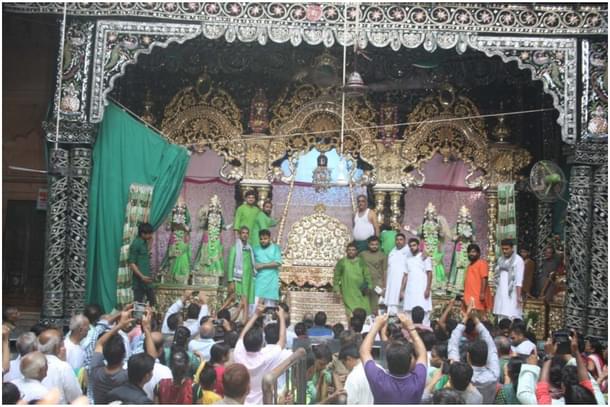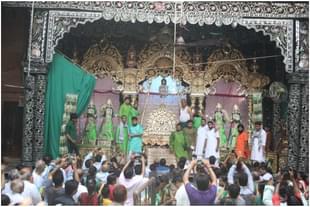Insta
Mathura Temple Viral Video: Management Says Incident Being Investigated; Priest Had Allowed Darshana To Select Few Before Gates Opened
Swarajya Staff
Dec 27, 2021, 02:36 PM | Updated 02:36 PM IST
Save & read from anywhere!
Bookmark stories for easy access on any device or the Swarajya app.


The sevayats of the Thakur Banke Bihari Mandir in Vrindavan, Uttar Pradesh, on Christmas Day (25 December) reportedly broke an age long tradition of the temple. The sevayats allowed some selected few to have darshana the deity even before the gates of the garbhagriha (sanctum sanctorum) were opened.
On Saturday, the devotees had gathered in huge numbers in the Thakur Banke Bihari Mandir in Vrindavan, Mathura, and were eagerly waiting to have the first sight of the deity, Shri Banke Bihari (Lord Krishna). Before the gates were formally opened for darshana, the Raj Bhoga sevadhikari had brought his yajaman family to the doorstep of Jagmohan, from where they were allowed darshana beforehand.
The video of the incident has gone viral on the internet. In the video, the devotees who had been waiting outside since early morning to have a glance of Thakur ji immediately are seen shouting to register their protest against the unfair advantage given to the said yajmanas.
As per the tradition of the temple, it is forbidden for anyone to have darshana of Banke Bihari before the pat (gates) of the garbhagriha are opened by the sevayats for the devotees. The rules of the temple also prohibits the visitors from taking photos or videos of the deity. Despite this, some people are secretly capturing pictures and videos from their mobile phones and are making them viral on social media. One such video has gone viral on social media on Saturday as well.
When the temple management came to know about the video that went viral on social media on Saturday morning, the temple management resorted to immediate action. The Assistant Manager informed that the management has taken cognizance of the incident, and the investigation is being done on the basis of the CCTV footage of the temple premises.
The final report will soon be submitted to the Civil Judge, Junior Division, who is the official head of the temple administration. The Civil Judge will then decide the further course of action in the matter.





